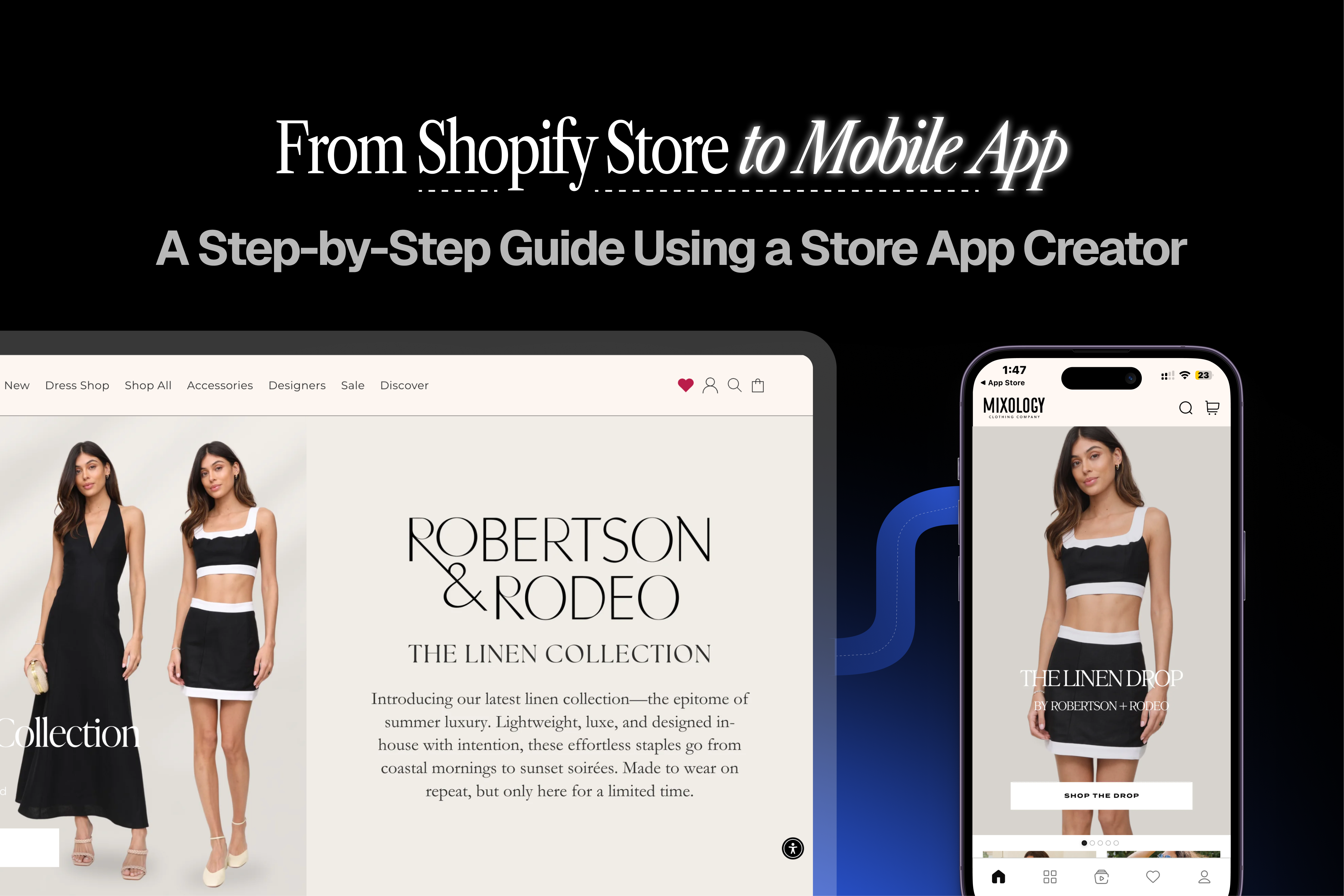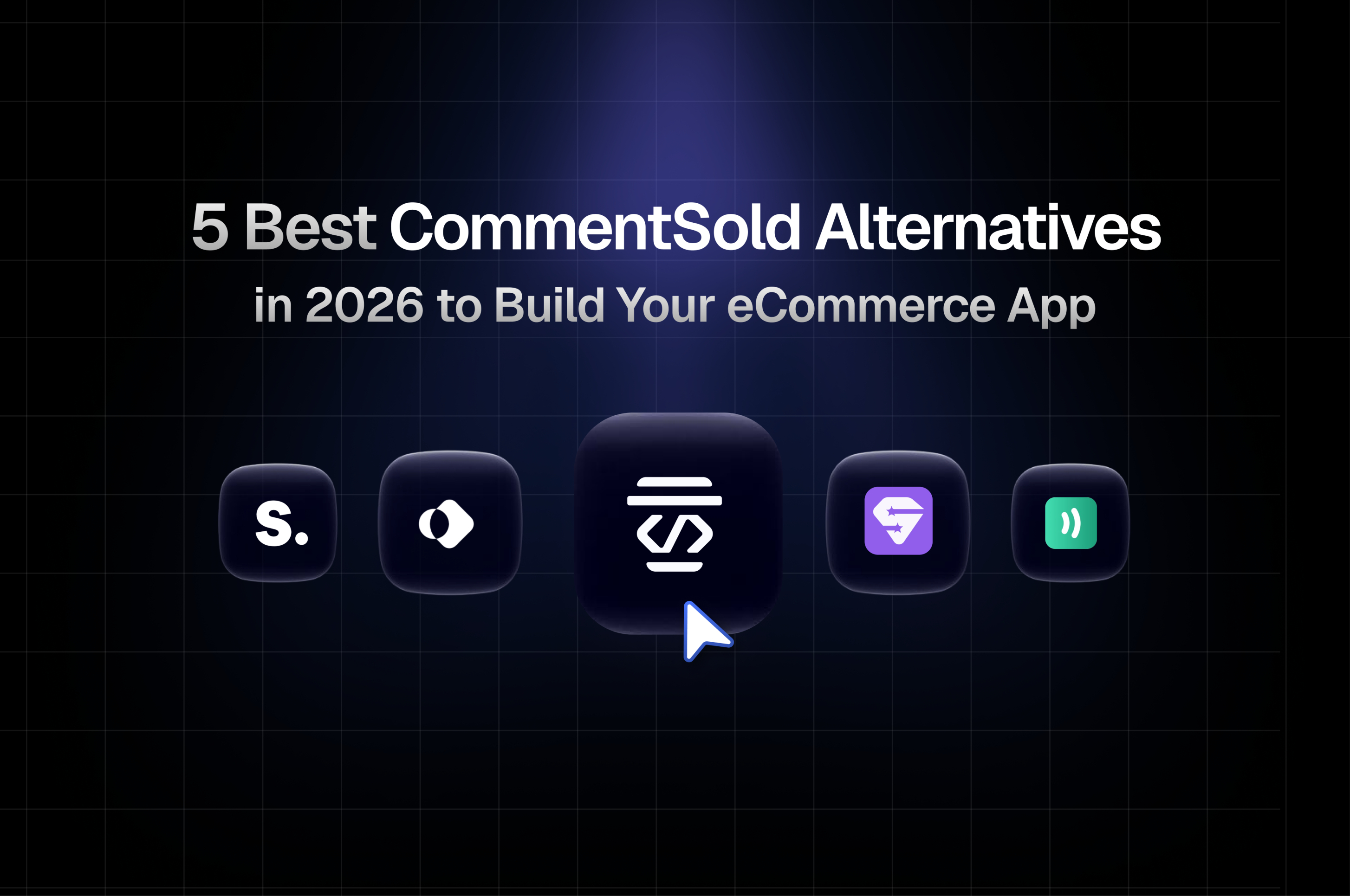More than 70% of customers start their shopping journey on a phone. However, browsing a store in a mobile browser often feels slow, clumsy, and forgettable. Customers notice, and many bounce before they ever reach checkout.
Mobile apps deliver speed, convenience, and repeat engagement that a mobile site simply can’t match. Converting your Shopify store into a mobile app, though, can be confusing, expensive, and time-consuming if you choose the wrong approach.
Below, you'll find:
- A step-by-step walkthrough of the best way to convert your Shopify store into an app
- What to look for when choosing a Shopify mobile app solution (and the red flags that'll cost you)
- Why Appbrew is the best Shopify mobile app builder for fast growing DTC brands
- A real case study showing 32% higher conversion rates post-launch
Ready to convert Shopify store into mobile app? Let's dive in.
How to convert your Shopify Store into a Mobile App?
Here's exactly how you can convert Shopify into mobile app without the headaches, technical complexity, or performance compromises.
Step 1: Log Into Your Shopify Store
Timeline: Day 1
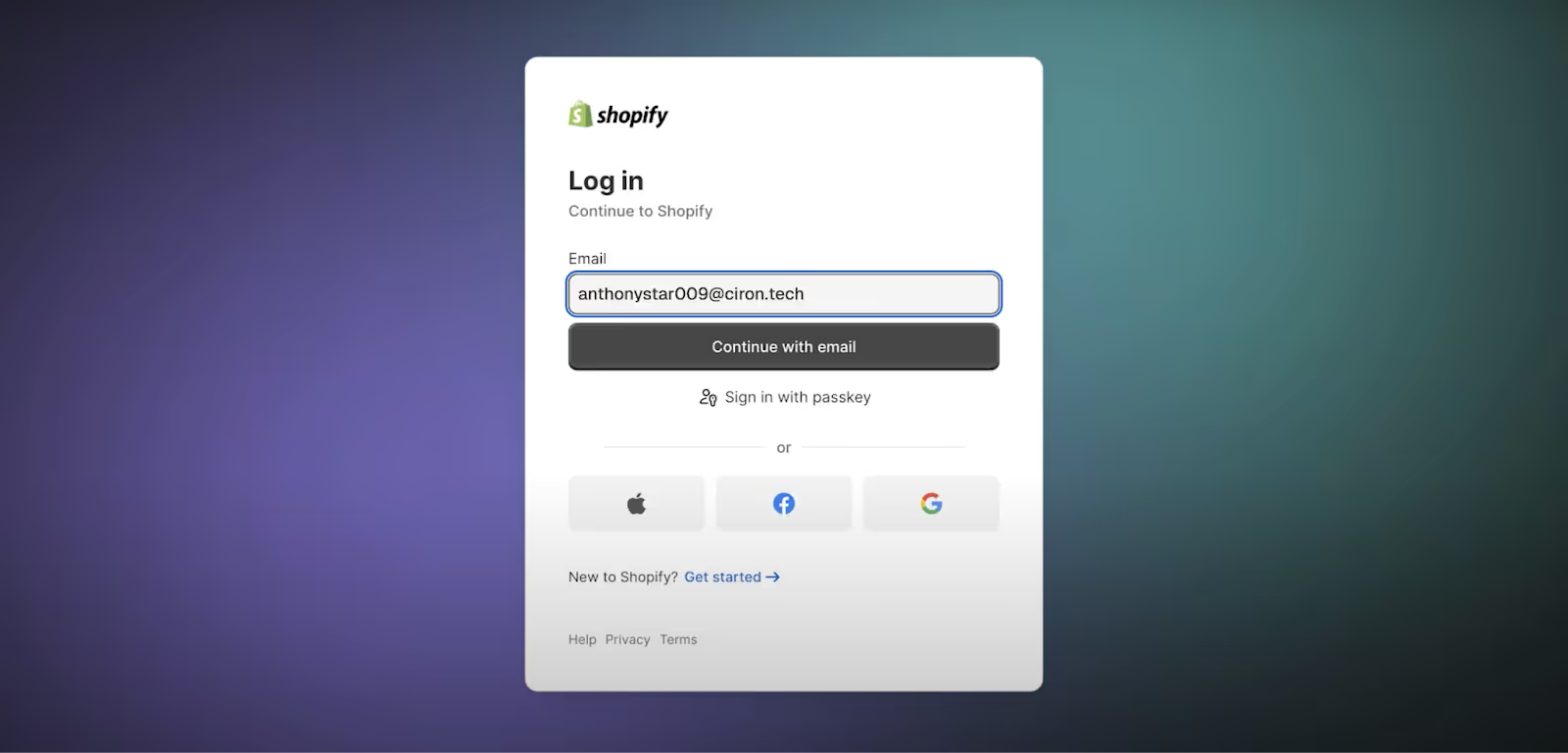
Start where you always start, your Shopify admin dashboard. You'll be installing Appbrew directly from the Shopify App Store, so no complicated API connections, no separate platforms to manage, and no technical setup required on your end.
Step 2: Search and Install Appbrew
Timeline: Day 1
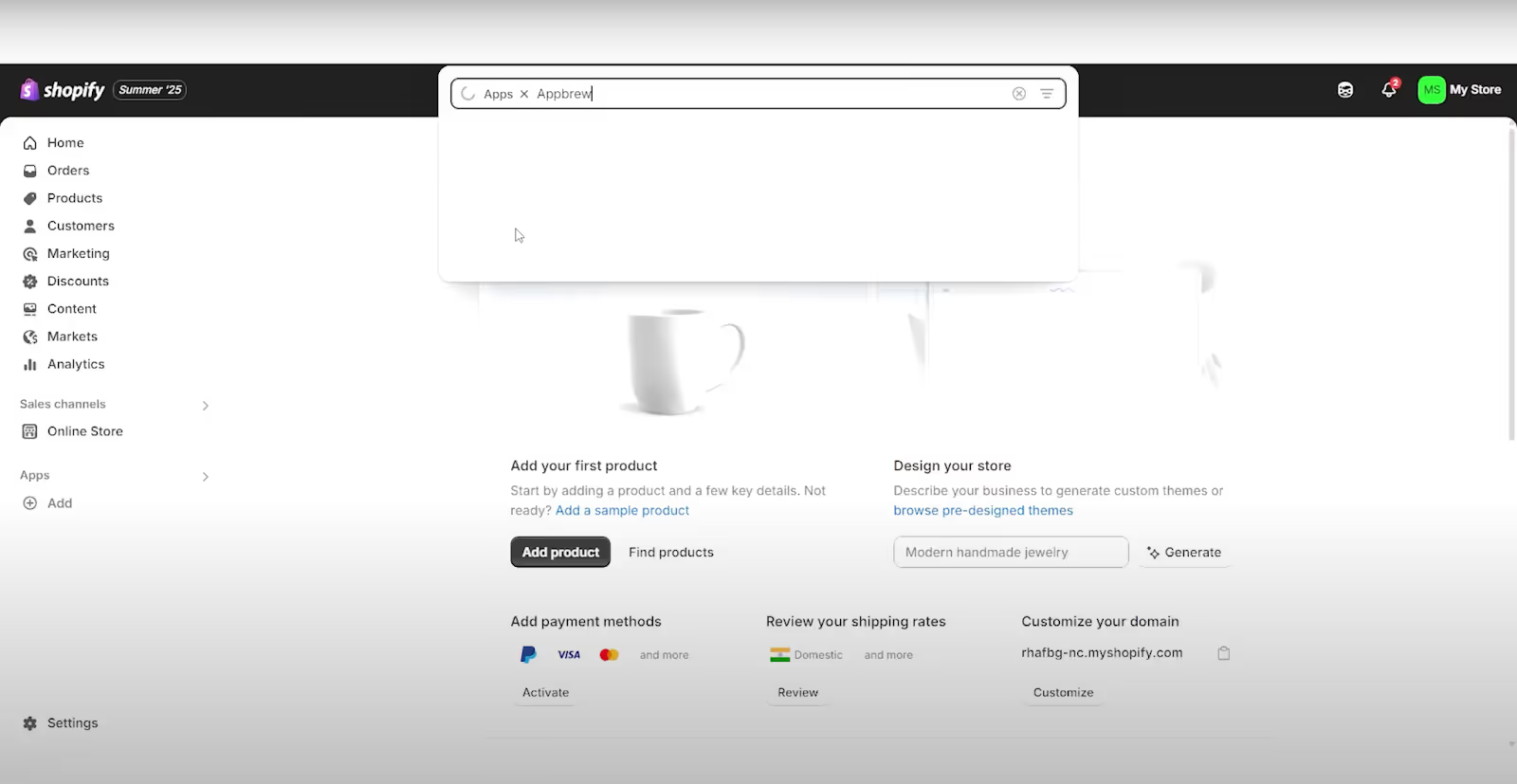
Go to your Apps section and search for "Appbrew." Install it with one click, no technical setup required on your end.
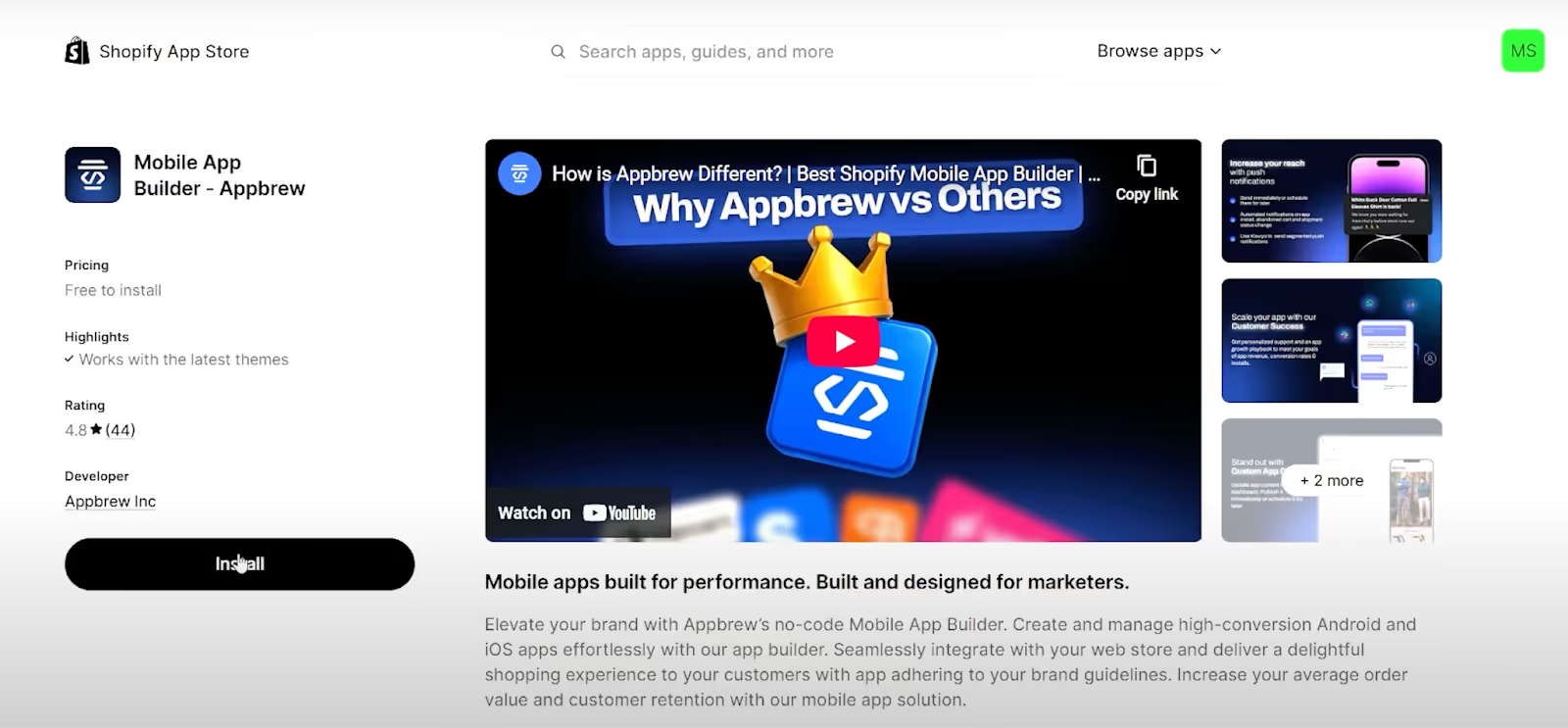
Step 3: Choose Your Plan (Free 30-Day Trial)
Timeline: Day 1

Pick the plan that fits your needs. Every plan comes with a 30-day free trial, so you can test everything before committing and you only pay after your app gets live on the PlayStore and App Store.
This gives you time to test everything: the performance difference, the customization options, the AI features, and the support quality before committing.
Step 4: Complete Your Design and Integration Forms
Timeline: Week 1
This is where the magic happens. (and where most other solutions fall short).
You'll fill out two forms:
- Design Form – Tell us about your brand guidelines, style preferences, specific features you need, and any custom functionality requirements. Our UI/UX designers create a completely custom design tailored to your brand. No templates; no cookie-cutter layouts; no "pick from these five options" limitations.
- Integrations Form – List every tool in your current tech stack: Klaviyo, loyalty programs, analytics platforms, subscription management, review systems, and anything else you're using. We'll make sure everything connects seamlessly (unlike other app builders that only support a handful of basic integrations).
The design process takes 1-2 weeks. Once you approve the design, our development team builds all the functionality, implements your integrations, and prepares your app for testing.
Step 5: Test and Give Feedback
Timeline: Week 3
You'll receive test versions of your app for both iOS and Android. Download them to your own devices and put them through their paces.
Test everything: social login: promotions; push notifications; personalization features; loading speeds; navigation smoothness; integration functionality.
Share any feedback or change requests. We handle all the technical implementation while you focus on the user experience and engagement
This is vastly different from DIY app builders, where you'd be doing all the testing, troubleshooting, and technical problem-solving yourself.
Step 6: Publish on App Store and Google Play
Timeline: Week 4
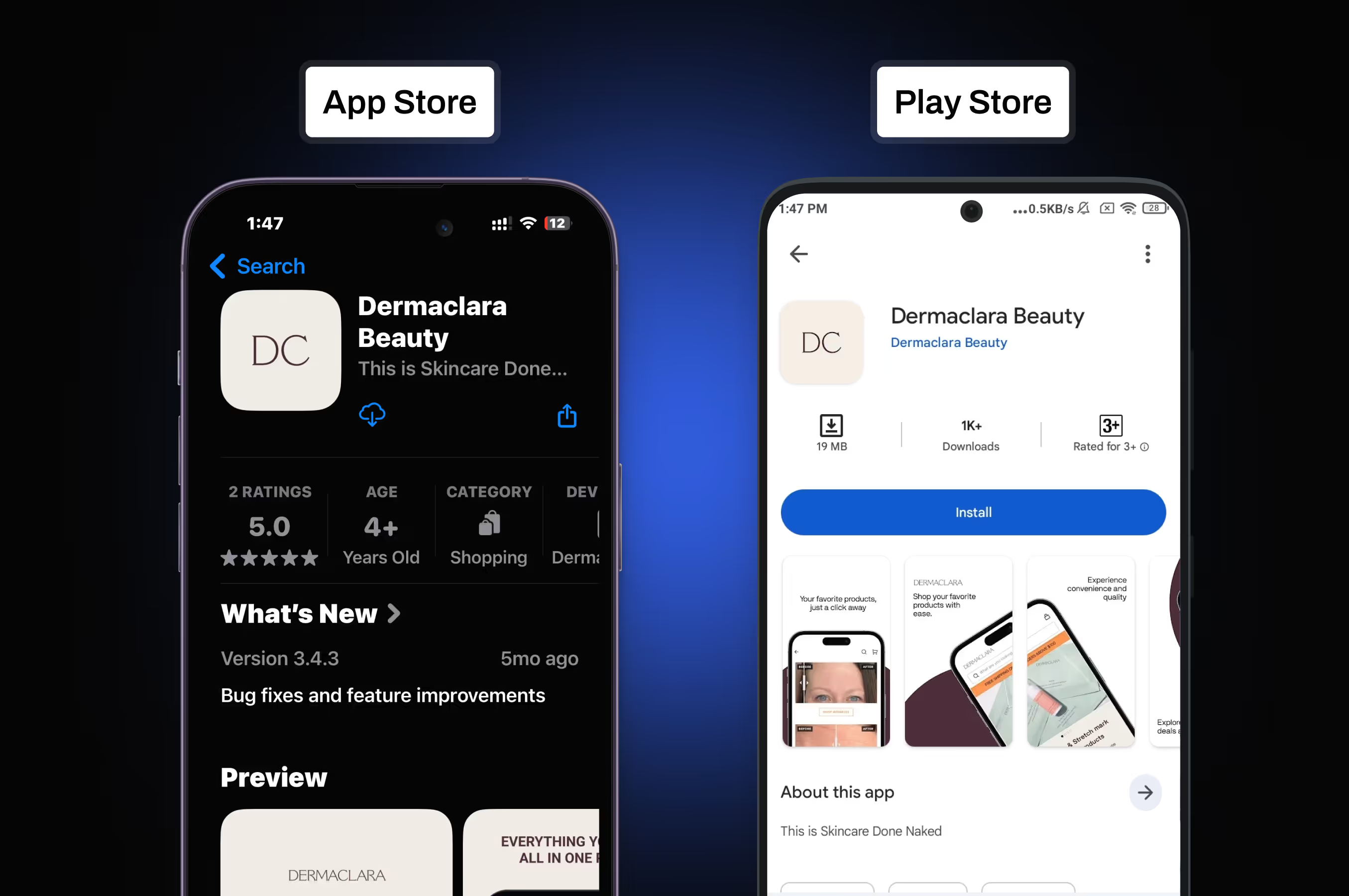
We handle the entire app store submission process for both iOS and Android.
This includes: preparing all store assets; writing store descriptions; managing the approval process; handling any feedback from Apple or Google; and ensuring your app goes live without delays.
Your app goes live without you having to navigate Apple's developer guidelines, Google Play policies, or the technical submission requirements.
Step 7: Growing Your App
Timeline: Ongoing

Now comes the exciting part, driving app adoption and growing revenue (where most app builders fail).
This includes: sharing growth playbooks from $100M brands, setting up smart app banners on your website; leveraging push notifications to drive repeat purchases; using AI personalization to increase conversions; and analyzing performance data to optimize continuously using Milo.
Unlike other solutions that leave you to figure this out alone, Appbrew provides ongoing strategy support and AI-powered insights to accelerate your app growth.
What to look for when converting your Shopify store into Mobile App
When most Shopify brands look to convert their Shopify into an mobile app using a Shopify mobile app builder, price and launch speed dominate the conversation.
But those aren’t the things that make or break app adoption. The real difference comes from how your app feels in a customer's hand and whether it keeps them coming back.
Want detailed comparisons between the top Shopify mobile app builders? Check out our head-to-head comparison vs. Tapcart, MobiLoud, Shopney, Vajro, and OneMobile.
1. Native Performance
Webview apps are essentially websites wrapped in an app shell. They load slowly; feel clunky; struggle with smooth scrolling; and deliver experiences that remind customers they're using a cheap solution.
React Native apps render using actual native iOS and Android components. They're 33% smaller in file size; load instantly without browser overhead; support native gestures and animations; and feel as smooth as H&M or Zara.
Your customers can tell the difference within seconds of opening your app. And that performance difference translates directly to conversions, engagement, and customer satisfaction.
2. Customization & Design Freedom
Most app builders lock you into rigid templates. You get a handful of pre-built layouts, limited color options, and basic customization controls. The result? Apps that look identical across different brands.
Fast-growing DTC brands need something different. Your app should reflect your unique brand personality, match your website's design language, and feel distinctly yours.
Look for solutions that provide: dedicated designers during onboarding; unlimited layout customization; drag-and-drop native editors; scheduled theme changes for campaigns; and the ability to create unlimited custom screens.
Your app should feel like a natural extension of your brand and not a generic template with your logo put on top.
3. AI Personalization
Static, one-size-fits-all experiences don't work in 2025. Your app should adapt dynamically to each customer's preferences, behavior, and purchase history with:
- Dynamic homepages, banners, collections based on location, purchase history, customer tags)
- Intelligent assistant that finds products and answers any questions customer may have
- Smart notifications triggered by specific behaviors and engagement signals
- AI skin analyzer for beauty brands for real-time facial scanning for personalized product recommendations
The best AI features work together seamlessly to create shopping experiences that feel genuinely personal and helpful.
4. Integrations
Your app needs to work perfectly with every tool you're currently using. Every marketing platform, analytics tool, loyalty program, and third-party service should function in your app exactly like it does on your website.
Look for mobile app builders with native integrations covering:
- Marketing (Klaviyo, Attentive, Meta)
- Analytics (AppsFlyer, Branch, Adjust)
- Loyalty programs
- Subscription management
- Review platforms
This integration depth means unified customer data, consistent experiences across all touchpoints, and maximum impact from your existing investments.
5. Analytics
You need to see exactly how your app is performing, where customers are dropping off, and which features drive the most revenue.
Look for Shopify mobile app builders providing comprehensive analytics including:
- Cross-platform attribution (complete user journey mapping)
- Behavioral heatmaps (visual analysis of user interactions);
- Push campaign intelligence (optimization of send times, segmentation, messaging)
- CRM integration for holistic customer journeys
- Conversion funnel analysis with specific drop-off points.
The best solutions combine these analytics with AI-powered insights that help you make data-driven optimization decisions.
6. Customer Success
Building the app is just the beginning. You need ongoing support to optimize performance, grow revenue, and stay ahead of mobile commerce trends.
Look for Shopify mobile app builders that provide:
- AI-assisted strategy recommendations
- 24/7 support focused on mobile commerce (not generic app management)
- Performance-based guidance
- Campaign analysis and optimization
The difference between generic app support and mobile commerce expertise is substantial and it shows in your results.
Why Appbrew is the Best Shopify Mobile App Builder for fast growing Shopify brands
Appbrew is purpose-built for fast-growing DTC brands who understand that mobile apps are a competitive advantage not just another marketing channel.
While other mobile app builders force you into templates, deliver subpar webview experiences, lack integrations or require extensive technical management, Appbrew gives you everything you need to compete with the biggest brands in mobile commerce.
1. Performance
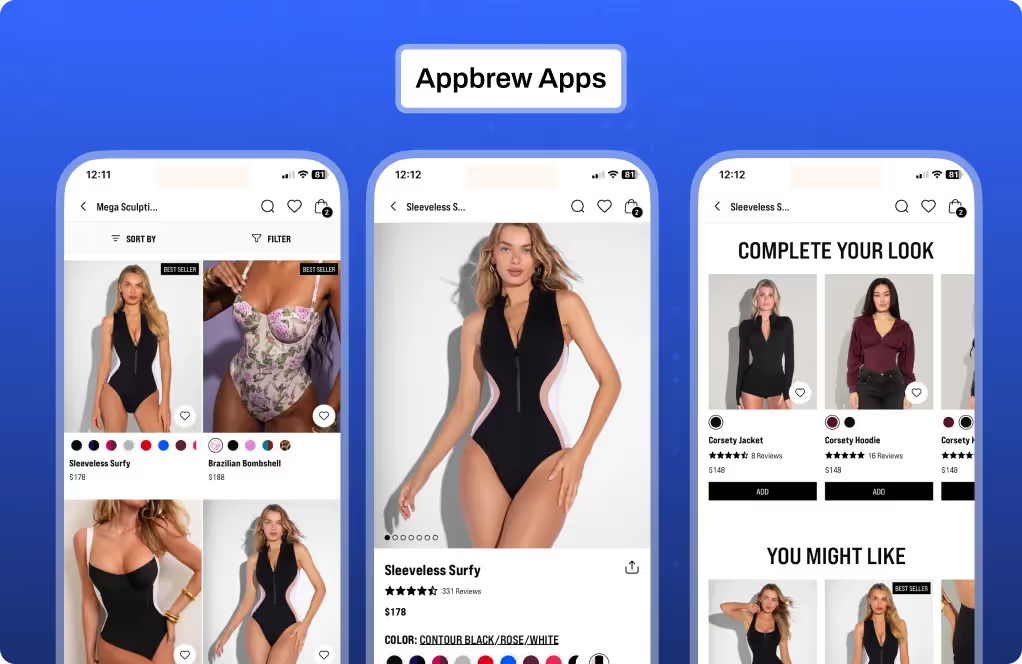
When someone scrolls through your collections in Appbrew, it feels instant. That’s because the app is powered by React Native, the same architecture behind H&M and Zara. Native animations, gesture support, and full device integration make it feel like a true app, not a website wrapped in an app. Brands see higher engagement simply because the experience is smooth.
2. Complete Design Customization
.avif)
Cookie‑cutter templates kill brand identity. That’s why Appbrew pairs every client with a designer from day one, ensuring the app feels like your storefront, not ours. Holiday drops, limited releases, and campaign‑driven pages can all be launched within hours—without waiting for a developer.
3. AI-Powered Personalization
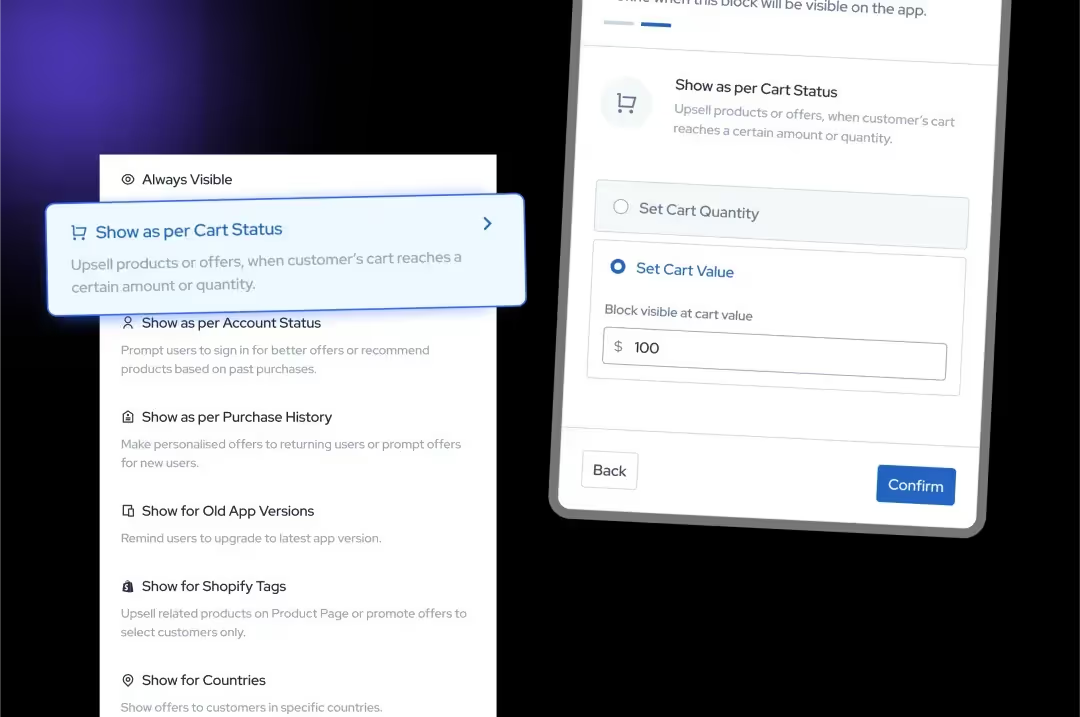
Ever opened an app and thought: “This was built for me”? That’s the experience Appbrew brands create. Every notification, recommendation, and promotion is tailored to a customer’s history, location, and behavior. A skincare brand, for example, can offer personalized routines or skin‑specific product bundles powered by our AI Skin Analyzer.
4. 120+ Deep Integrations
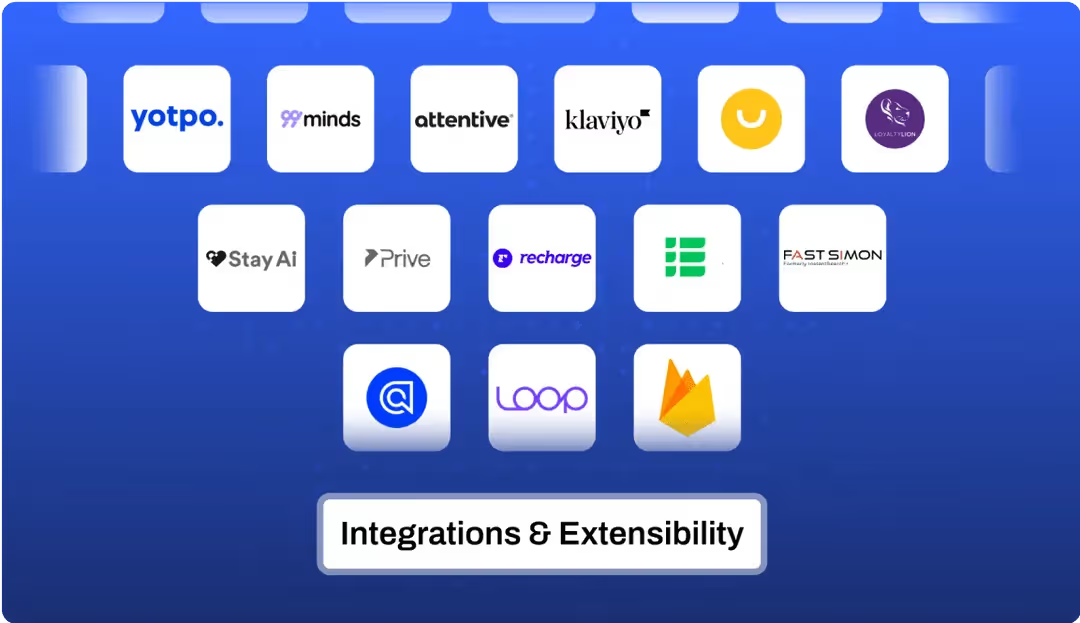
You’ve already invested in tools that build loyalty, track sales, and run campaigns. Appbrew integrates with 120+ of them natively, from subscriptions and reviews to analytics and loyalty platforms.
5. Advanced Promotions Engine
.avif)
With Appbrew, you can push VIP exclusives, bundles, or cart‑goal discounts directly in the shopping flow. Brands use it to nudge average order values higher without killing margins.
6. Analytics

Appbrew's advanced analytics combined with Milo (AI CoPilot) helps you make data-driven decisions about app optimization, marketing campaigns, and user experience improvements. You can see exactly which features drive conversions and where customers drop off in the shopping journey.
7. 24/7 Customer Success & Support
Our clients don’t just get a support inbox. They always get a partner. Appbrew’s team specializes in mobile growth, offering recommendations, campaign strategies, and performance insights that go beyond troubleshooting.
Case study
Dermaclara, a premium skincare brand, switched to Appbrew from a traditional app builder and saw a 32% increase in conversion rate, 3.5x growth in app-driven revenue and, 5.5x increase in user engagement.
With Appbrew, Dermaclara got:
- A performance-first app that reflects the precision and trust behind their skincare line
- Clara, the AI Concierge, bringing personalization and education to the forefront
- A fluid, fast UI that makes discovery and reordering seamless
- Brand-specific features like native subscriptions, reviews, and loyalty dashboards
- A hands-on success team that felt more like a strategic partner than a support line
The difference was immediately noticeable. Where their previous app felt slow and generic, their new Appbrew app delivered the premium experience their brand deserved.
Ready to convert Shopify store into a mobile app?
Converting Shopify store into a mobile app doesn't have to be complicated or expensive. With Appbrew, you can convert your Shopify store to a mobile app in under 4 weeks.
Appbrew makes it simple:
- React Native performance that customers notice immediately
- Complete design customization with a dedicated designer
- AI-powered personalization that drives conversions
- 120+ integrations with your existing tech stack
- 24/7 support focused on mobile commerce growth
Want to convert your Shopify into Mobile App? Book a Free demo with Appbrew and get your free 30-day trial started today.
FAQs About Converting Your Shopify Store Into a Mobile App
1. How do I create a mobile app for my Shopify store?
The easiest approach is using Appbrew -Shopify mobile app builder. Install it from the Shopify App Store, complete the onboarding process, and we handle everything from design to app store publication. You'll have a live app in under 4 weeks.
2. Is it worth converting my Shopify store into a mobile app?
Absolutely. Apps typically deliver 3x higher conversion rates than mobile websites; enable push notifications for direct communication; provide better personalization capabilities; and improve customer retention through convenient reordering and loyalty features.
3. How can you convert your Shopify store into a mobile app?
You have three main options: hire developers (expensive and slow, but unlimited customization); use traditional app builders (quick and cheap, but limited by webview technology and templates); or choose a Shopify Mobile App Builder like Appbrew (fast launch, native performance, unlimited customization, AI features).
4. How much does it cost to make a Shopify app?
Custom development runs $50,000-$100,000+ upfront plus ongoing maintenance costs. Traditional app builders range from $50-$500/month but require significant time investment to manage. Appbrew provides enterprise-grade features with transparent pricing and a 30-day free trial.
5. How to create a custom app for my Shopify store?
With Appbrew, every app is custom-designed for your brand. You get a dedicated designer during onboarding who creates layouts specifically for your requirements, plus unlimited customization capabilities through our drag-and-drop native editor.
6. How to choose the right Shopify mobile app builder?
Focus on performance architecture (React Native vs. webview); customization capabilities (custom design vs. templates); AI and personalization features; integration depth with your existing tools; and the quality of ongoing support.

.avif)

